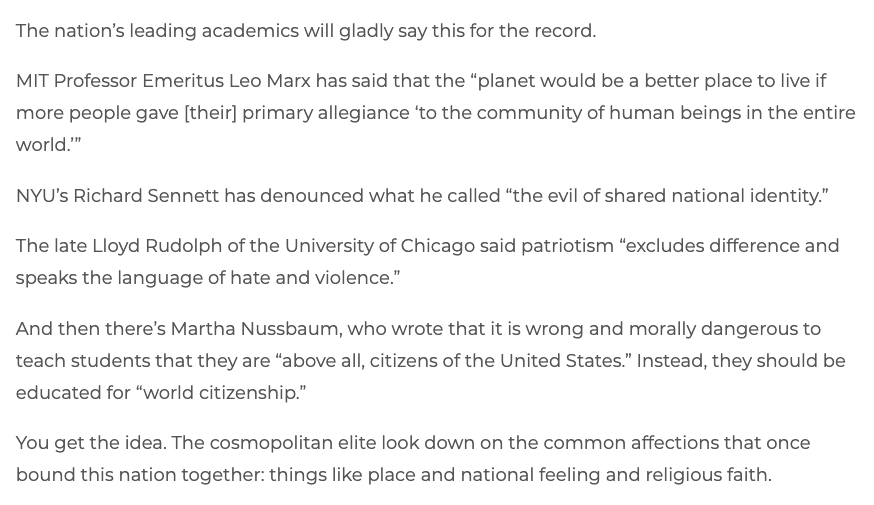GOP Sen. Josh Hawley grossly mischaracterized the views of 4 academics in his 'cosmopolitan elites' speech
He cherry-picked old quotes to say they were contemptuous of America. It's not true.


A free daily email with the biggest news stories of the day – and the best features from TheWeek.com
You are now subscribed
Your newsletter sign-up was successful
The GOP's wunderkind doesn't appear to do his homework.
In his recent keynote address at the National Conservatism Conference, Sen. Josh Hawley (R-Mo.) spoke about how a "cosmopolitan elite" has sold out the American middle and working classes to multinational corporations. They have "encouraged multinational corporations to move jobs and assets overseas to chase the cheapest wages and pay the lowest taxes." These business then invest their profits "not in American workers, not in American development, but in financial instruments that benefit the cosmopolitan elite."
As Alexander Zaitchik writes at The New Republic, the speech was at bottom an attempt to paint an intellectual veneer on the politics of President Trump. In the days since, Hawley has been both hailed and panned as the future of the Republican Party.
The Week
Escape your echo chamber. Get the facts behind the news, plus analysis from multiple perspectives.

Sign up for The Week's Free Newsletters
From our morning news briefing to a weekly Good News Newsletter, get the best of The Week delivered directly to your inbox.
From our morning news briefing to a weekly Good News Newsletter, get the best of The Week delivered directly to your inbox.
Hawley characterized four American academics — Richard Sennett, Martha Nussbaum, Leo Marx, and Lloyd Rudolph — as leaders of this elite, charging that they "distrust patriotism" and "look down on the common affections that once bound this nation together: things like place and national feeling and religious faith."

But closer examination reveals the quotes Hawley attributed to the academics are either misleading or simply deceptive. (The senator's office did not respond to an emailed request for comment about this story.)
Hawley characterizes a 1994 article from University of Chicago law professor Martha Nussbaum like this: She "wrote that it is wrong and morally dangerous to teach students that they are 'above all, citizens of the United States.' Instead, they should be educated for 'world citizenship.'" In fact, Nussbaum was careful to qualify that students should give "special attention to the history and current situation of their own nation" and that her view "does not mean that one may not permissibly give one's own sphere a special degree of concern."
What's more, when contacted for comment by The Week, Nussbaum added that she "repudiated" her 1994 position "starting in articles from 2001." She now defends a "globally sensitive patriotism" in her books Political Emotions and The Cosmopolitan Tradition: A Noble but Flawed Ideal, published 19 and 25 years after the article Hawley quotes from.
A free daily email with the biggest news stories of the day – and the best features from TheWeek.com
Leo Marx, a former professor of American Studies at MIT, is quoted by Hawley as saying the "planet would be a better place to live if more people gave [their] primary allegiance 'to the community of human beings in the entire world.'" But this is presented as a utopian idea in the first paragraph of his article (a 1994 response to Nussbaum), and the entire rest of the piece raises problems with it. Marx notes that group and place-based identities are extremely powerful, which can't be simply abstracted away, and indeed defends certain aspects of American identity. For Hawley to say that he is contemptuous of "place and national feeling and religious faith" is simply wrong. (Marx did not respond to an emailed request for comment.)
Richard Sennett, a professor of sociology and history at NYU, did write (in a 1994 New York Times op-ed) that "The challenge and the promise of American society lie in finding ways of acting together without invoking the evil of a shared national identity." But when reached for comment by The Week, he disputed Hawley's broader attack. "I'm for a sense of place, and certainly for religious faith, but I'm against nationalism of the Trump sort, which celebrates our country at the expense of demeaning other people, places, and faiths." Indeed, Sennett's 2012 book Together is an exploration of just the type of social norms and structures, including religion, that allow for broad social cooperation and healthy national functioning.
Finally, Hawley quotes Lloyd Rudolph, a former professor of political science at the University of Chicago who died in 2016, as saying patriotism "excludes difference and speaks the language of hate and violence." Hawley has truncated this quote to remove crucial context and change its meaning. Indeed, Rudolph defends certain types of patriotism, writing:
Martin Luther King articulated and affirmed American patriotism in his inclusivist, non-violent pursuit of civil rights for African Americans. Today, his legacy helps gays and lesbians, single mothers, and new immigrants to claim civil rights and contributes to the discourse and practice of human rights in world arenas. [Boston Review]
Hawley's quote from Rudolph above specifically refers only to "scoundrel patriots of our time" like Oliver North, Pat Buchanan, Pat Robertson, and Jerry Falwell. "Their patriotism excludes difference and speaks the language of hate and violence," Rudolph writes. Removing the first word sharply alters the meaning of the piece — making it appear as though Rudolph is contemptuous of patriotism as such, when he is only referring to a limited set of criminals and bigots.
It's hard to know why Hawley had to reach back to 1994 and sharply bend the words he found there to create the impression of an American academy united in its contempt for patriotism and American identity. Indeed, most of the discourse cycle quoted here was part of an argument sparked by the late philosopher Richard Rorty, who accused leftist academics of being insufficiently patriotic. (As usual, academics were spending just as much time arguing with each other as they were pointing out social problems.) But it does speak to the intellectual seriousness of Sen. Hawley's political project.
Ryan Cooper is a national correspondent at TheWeek.com. His work has appeared in the Washington Monthly, The New Republic, and the Washington Post.
-
 How to Get to Heaven from Belfast: a ‘highly entertaining ride’
How to Get to Heaven from Belfast: a ‘highly entertaining ride’The Week Recommends Mystery-comedy from the creator of Derry Girls should be ‘your new binge-watch’
-
 The 8 best TV shows of the 1960s
The 8 best TV shows of the 1960sThe standout shows of this decade take viewers from outer space to the Wild West
-
 Microdramas are booming
Microdramas are boomingUnder the radar Scroll to watch a whole movie
-
 The billionaires’ wealth tax: a catastrophe for California?
The billionaires’ wealth tax: a catastrophe for California?Talking Point Peter Thiel and Larry Page preparing to change state residency
-
 Bari Weiss’ ‘60 Minutes’ scandal is about more than one report
Bari Weiss’ ‘60 Minutes’ scandal is about more than one reportIN THE SPOTLIGHT By blocking an approved segment on a controversial prison holding US deportees in El Salvador, the editor-in-chief of CBS News has become the main story
-
 Has Zohran Mamdani shown the Democrats how to win again?
Has Zohran Mamdani shown the Democrats how to win again?Today’s Big Question New York City mayoral election touted as victory for left-wing populists but moderate centrist wins elsewhere present more complex path for Democratic Party
-
 Millions turn out for anti-Trump ‘No Kings’ rallies
Millions turn out for anti-Trump ‘No Kings’ ralliesSpeed Read An estimated 7 million people participated, 2 million more than at the first ‘No Kings’ protest in June
-
 Ghislaine Maxwell: angling for a Trump pardon
Ghislaine Maxwell: angling for a Trump pardonTalking Point Convicted sex trafficker's testimony could shed new light on president's links to Jeffrey Epstein
-
 The last words and final moments of 40 presidents
The last words and final moments of 40 presidentsThe Explainer Some are eloquent quotes worthy of the holders of the highest office in the nation, and others... aren't
-
 The JFK files: the truth at last?
The JFK files: the truth at last?In The Spotlight More than 64,000 previously classified documents relating the 1963 assassination of John F. Kennedy have been released by the Trump administration
-
 'Seriously, not literally': how should the world take Donald Trump?
'Seriously, not literally': how should the world take Donald Trump?Today's big question White House rhetoric and reality look likely to become increasingly blurred
